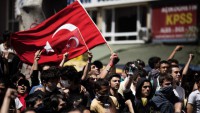
This post, written by Natasha Kieval, STAND’s Programs Intern, is the first post in our “Countries to Watch” series that follows developing conflicts. Check back in the coming weeks!
Turkey has been all over the news lately because of recent populist protests that were met with tear gas and a harsh government response. Environmental activists in Istanbul began protesting after plans were announced regarding Gezi Park. The government plans to remove trees and develop it into a shopping center and ceremonial military barracks. After peaceful protesters were evicted from the park, issues of freedom of assembly and freedom of expression emerged, and the protests have broadened into more general anti-government protests. Citizens have been protesting what they see as “creeping Islamisation” of the Recep Tayyip Erdogan regime, whose conservative AKP party (standing for Adalet ve Kalkınma Partisi, or the Justice and Development Party) has been in power for a decade. The government has been seen as becoming more conservative and authoritarian over the course of its rule. Recently, laws curbing the use of alcohol were passed. Additionally, there has been much opposition to the government’s stance on Syria. Erdogan has staunchly supported the Syrian opposition, polarizing Turkey. Many Turks believe this support will cause the Syrian government to retaliate and harm Turkey. These protests have called for Erdogan’s resignation.
Unlike previous anti-government protests in Turkey hosted by a singular ethnic group or ideology, these protests have shown a wide range of the civilian body. As Whit Mason of Foreign Policy stated, “Turkey has become a much more liberal society” over the past ten years. In that vein, it will be interesting to see how the next few months unfold, especially given Turkey’s 2014 elections.
The Turkish government has already made some political changes since the Arab Spring began in 2011. Mesut Özcan, Bulent Aras, and Saban Kardas of the Turkish Foreign Ministry’s Strategic Research Center spoke recently on the shift in Turkey’s foreign policy since the Arab Spring at the Wilson Center event “Turkey and the Arab Spring.” For Turkey, the Arab Spring forced a recalibration of foreign policy. Özcan spoke of a specific shift – pre-Arab Spring, Turkey attempted to develop good economic and political ties with all neighboring countries. With the Arab Spring came polarization of regional actors, he said, which has made it more difficult to maintain a fairly neutral regional position. This is especially implicated in the context of the Sunni and Shi’a blocs in the region. According to Özcan, Aras, and Kardas, it is no longer possible for Turkey to try to mediate between the two blocs. Instead, they are forced to pick a side. This is relevant in the context of Syria. Turkey and Syria both have a Sunni majority. However, relations between the two nations have long been strained due to Syria’s relationship with the PKK (a Kurdish party that supports an autonomous Kurdistan), water disputes, and Syria’s support for the Armenian Secret Army for the Liberation of Armenia (ASALA). Relations have become even more tense since the Syrian conflict began, as refugees flood into Turkey and as Assad has recently criticized the Erdogan government for his response to the protests.
It was announced on Friday that due to the proof of the Syrian government’s use of chemical weapons, the United States will be boosting its military support of the main opposition group, the SMC. Erdogan has previously called for multilateral intervention in Syria, and it will be interesting to see what his response is to the change in U.S. policy.
Turkey is a dynamic country that promises many changes in the coming months. On Friday, Erdogan adopted a more conciliatory tone for the protesters. However, as of this morning, Erdogan and the government have threatened to deploy the army to end the unrest. When speaking to a crowd of supporters over the weekend, he referred to the unrest as “nothing more than the minority’s attempt to dominate the majority.” The results of these protests remain unclear, and are certainly something to follow. If you are interested in learning more about Turkey and its international relationships, Jadaliyya is a good spot to look. For more specifics on the protests, check out Crisis Group’s blog or Al Jazeera’s live blog here.
